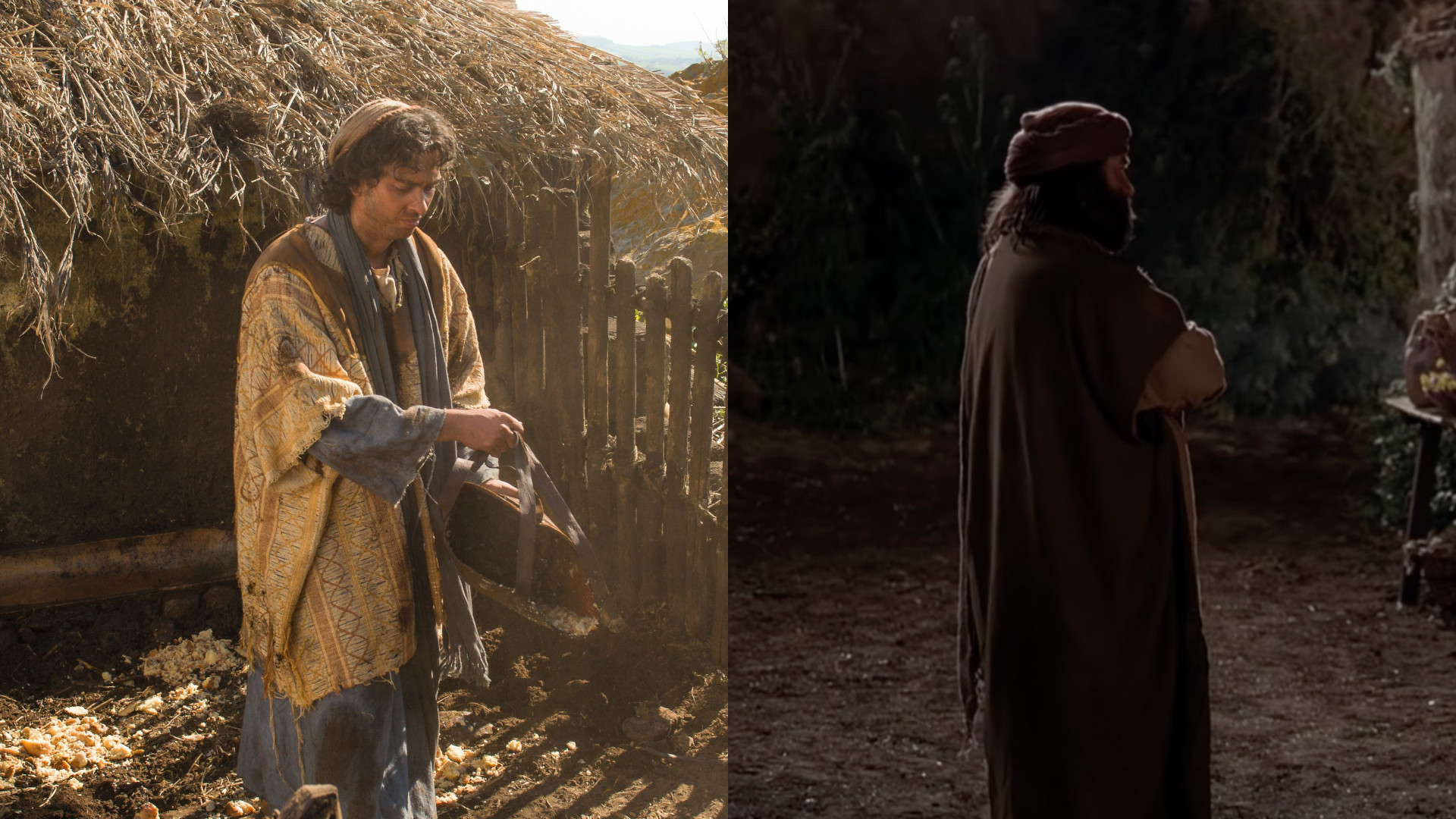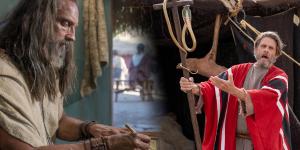You are here
How Does the Parable of the Prodigal Son Teach Us about Repentance?

Luke 15:22–24
The Know
As Jesus was teaching on one occasion, a large crowd followed Him. A large part of this crowd included “publicans and sinners” interested in hearing the gospel, which angered the Pharisees and Sadducees who were present and led them to murmur among themselves and say, “This man receiveth sinners, and eateth with them” (Luke 15:1–2).
This comment drew out three parables from Jesus about repentance and joy. The final of the three, often called the parable of the prodigal son, clearly exemplifies the need that all people have for repentance by demonstrating how two different sons of a loving father both needed and obtained His mercy.
According to this parable, “a certain man had two sons: and the younger of them said to his father, Father, give me the portion of goods that falleth to me. And he divided unto them his living. And not many days after the younger son gathered all together, and took his journey into a far country, and there wasted his substance with riotous living” (Luke 15:11–13).
As John and Jeannie Welch have noted, this parable “is a story about getting lost—really lost. Unlike the sheep that cluelessly wanders off and gets physically lost [Luke 15:4–7], and unlike the coin that has nothing at all to do with being dropped out of sight in some dusty corner [Luke 15:8–10], the younger son had left his home intentionally, rebelliously, and insolently. … He got himself lost in a spiritual way that only he can undo.”1 He took his share of the family’s inheritance and went and consumed it in riotous living.
This younger son’s pride, however, would cause him a great deal of suffering. The parable continues, “And when he had spent all, there arose a mighty famine in that land; and he began to be in want. And he went and joined himself to a citizen of that country; and he sent him into his fields to feed swine. And he would fain have filled his belly with the husks that the swine did eat: and no man gave unto him” (Luke 15:14–16). The sad state of this son’s life at this point is made especially clear in a later Talmudic proverb: “Cursed is the person who raises pigs, and cursed is the person who teaches his son Greek wisdom.”2
Of this son’s dire position in life, caused especially by his many poor choices, Elder Jay E. Jensen once observed, “To fall that low could only illustrate with even greater power the main theme of the parable: can a swineherder—someone who occupies a base, vile, degrading position—be accepted, be forgiven, and be permitted to rejoice ‘in the presence of the angels of God?’”3 The answer, of course, is yes—no matter how lost this son was, his father was concerned for him with an infinite love.
Ultimately, the son comes to his senses and makes a long, humbling trek home. Though the son was willing to be a servant to his father, “when he was yet a great way off, his father saw him, and had compassion, and ran, and fell on his neck, and kissed him” (Luke 15:20). The father then kills the fatted sacrificial calf and holds a great feast celebrating the return of his wayward son.
In this sense, the father in this parable is representative of God: “The father was patient, generous, embracing, and joyous. Most of all, he was filled with compassion.”4 Such traits perfectly exemplify God’s love and concern for all of us. As such, “The details in this story, telling the steps taken by the desperate younger son, perfectly show how one can repent, repair, and rebuild a broken relationship of mutual trust.”5
In many ways, the younger son represents everyone, “for all have sinned, and come short of the glory of God” (Romans 3:23). We are all in need of repentance and at various times in our lives will need to come to ourselves and recognize what we have to do to repent, change, and return home (see Luke 15:17).
However, often overlooked in this parable is the situation of the elder son, who remained faithful to his father for many long years. As this parable portrays, this son was likewise lost and needed his father to come out to save him too. When the elder son heard that his younger brother had come home, “he was angry, and would not go in: therefore came his father out, and entreated him” (Luke 15:28). Angry and perhaps rightfully indignant at his brother’s foolishness and disrespect for their father and the whole family for many long years, he was unable to see the troubles and subsequent deep repentance his brother had experienced.
As Elder Jensen observes, “The fact that the father left the festivity, which he did not have to do, and entreated his son is evidence to me of the mercy and condescension of God the Father.”6 In his earnest pleadings with his son, he reassures him, “Son, thou art ever with me, and all that I have is thine” (Luke 15:31), and urges him to look compassionately on his brother, who had spent years in a state of spiritual death: “For this thy brother was dead, and is alive again; and was lost, and is found” (Luke 15:32).
Such a pleading would have been an effective rebuke against the unforgiving Pharisees in Jesus’s audience, to whom these three parables were initially directed. Ultimately, it was they who reflected the attitudes of the elder son most of all, and both the Father and the Son desired their repentance just as much as the repentance of publicans and sinners: “The Savior held out hope for them. If they would be entreated, they could enjoy the blessings of heaven. If they would accept and follow the counsel of the Father, He would say, ‘All that I have is thine.’ If they refused to accept the message, their hypocritical, self-righteous attitude (like that of the elder son) would lead to their destruction.”7
The Why
King Benjamin once posed the question, “Are we not all beggars?” (Mosiah 4:19). Such a question effectively describes how we should read this parable. All of us—whether we have wandered off the covenant path for a time or have remained dutifully obedient to our Heavenly Father—are in need of salvation. We all depend on Jesus Christ and His Atonement every day of our lives.
Elder Jeffrey R. Holland described the two sons of this story: “Certainly this younger brother had been a prisoner—a prisoner of sin, stupidity, and a pigsty. But the older brother lives in some confinement, too. He has, as yet, been unable to break out of the prison of himself. He is haunted by the green-eyed monster of jealousy. He feels taken for granted by his father and disenfranchised by his brother, when neither is the case.”8
However, despite our wayward and lost condition and no matter our circumstances, the Father will treat us with joy and love: “The father in this story does not tantalize his children. He does not mercilessly measure them against their neighbors. He doesn’t even compare them with each other. His gestures of compassion toward one do not require a withdrawal or denial of love for the other. He is divinely generous to both of these sons. Toward both of his children he extends charity.”9 Ultimately, the Lord’s mercy and compassion are extended to all of His children who come unto Him and strive to forgive as He forgives. Rather than being envious of a wayward one’s return, everyone can generously rejoice together with our Father and the entire human family upon the return of any other, offering sincerely the sacrifice of a broken heart and a contrite, forgiving spirit.
Further Reading
John W. Welch and Jeannie S. Welch, The Parables of Jesus: Revealing the Plan of Salvation (American Fork, UT: Covenant Communications, 2019), 102–111.
Jay E. Jensen, “The Parable of the Two Sons: A Revelation about God,” in Sperry Symposium Classics: The New Testament, ed. Frank F. Judd Jr. and Gaye Strathearn (Provo, UT: Religious Studies Center, Brigham Young University; Salt Lake City: Deseret Book, 2006), 25–35.
Jeffrey R. Holland, “The Other Prodigal,” April 2002 general conference.
- 1. John W. Welch and Jeannie S. Welch, The Parables of Jesus: Revealing the Plan of Salvation (American Fork, UT: Covenant Communications, 2019), 105.
- 2. Talmud, Sotah 49b:10. See also Jay E. Jensen, “The Parable of the Two Sons: A Revelation about God,” in Sperry Symposium Classics: The New Testament, ed. Frank F. Judd Jr. and Gaye Strathearn (Provo, UT: Religious Studies Center, Brigham Young University; Salt Lake City: Deseret Book, 2006), 27.
- 3. Jensen, “Parable of the Two Sons,” 27, citing Luke 15:10.
- 4. Welch and Welch, Parables of Jesus, 103.
- 5. Welch and Welch, Parables of Jesus, 106.
- 6. Jensen, “Parable of the Two Sons,” 31.
- 7. Jensen, “Parable of the Two Sons,” 32.
- 8. Jeffrey R. Holland, “The Other Prodigal,” April 2002 general conference.
- 9. Holland, “The Other Prodigal.”
KnoWhy Citation
Related KnoWhys
Subscribe
Get the latest updates on Book of Mormon topics and research for free





